
Occupy Central
Occupy Central is a civil disobedience movement which began in Hong Kong on September 28, 2014. It calls on thousands of protesters to block roads and paralyse Hong Kong's financial district if the Beijing and Hong Kong governments do not agree to implement universal suffrage for the chief executive election in 2017 and the Legislative Council elections in 2020 according to "international standards." The movement was initiated by Benny Tai Yiu-ting (戴耀廷), an associate professor of law at the University of Hong Kong, in January 2013.
OCCUPY CENTRAL - DAY 54: Full coverage of the day’s events
Rumour of copyright vote may have led to storming of Legislative Council building
Violence outside Legco which has widened split in protest camp may have been sparked by erroneous rumour of vote on copyright bill
PUBLISHED : Thursday, 20 November, 2014, 4:20am
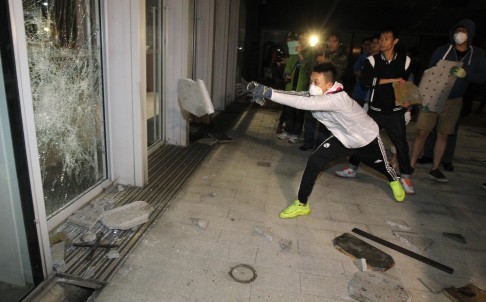
Who stormed the Legco complex? Student leaders were adamant they did not instigate the violence, and the pan-democratic camp was quick to distance itself from events.
However, a strong clue emerged when someone at the scene in Admiralty used a megaphone to address the crowd before the assault was launched.
"We are besieging the entrances of Legco to stop lawmakers from attending a meeting tomorrow [yesterday morning] so that 'Article 23' cannot be passed smoothly," he said.
Suspicion immediately fell on "keyboard fighters" - internet users who instigate unrest.
On Tuesday, a handful had taken to popular online forum HKGolden.com to express their worries about a controversial copyright amendment bill - labelled by some as the online version of the Article 23 antisubversion law, which was shelved a decade ago after mass protests. The bill, if passed, would limit online freedom of speech, many believe.
The government has for years been trying to strengthen copyright laws to offer more protection for copyright holders online and meet international standards. But it has faced opposition amid concerns that parodies and satire would suffer. A previous bill was dropped in 2012.
Some who replied to the online alert urged protesters to escalate their actions. What subsequently happened was captured graphically by TV cameras.
Scores of masked protesters emerged early yesterday morning to storm the Legislative Council, battering a glass window with a metal barrier and lumps of concrete and injuring three police officers.
Six men aged 18 to 25 were arrested. A full Legco meeting and a public works subcommittee meeting scheduled for yesterday were called off.
The online campaign had begun when a man calling himself Yip Ching-shun posted a message online saying: "What the government does is to inevitably force people to rise against it. Let's surround Legco."
Yip accused the government in another online post of wanting to pass the bill on Tuesday.
But the bills committee on the Copyright (Amendment) Bill 2014 only met to discuss details.
Another user, called Japanese Buffet Convenor, suggested: "Even if you got there, no one has the guts to break the glass and storm in."
Posts with similar suggestions emerged throughout the day, though some users pointed out that the bill would not be put to the vote until next year.
Watch: Clashes as alleged Hong Kong protesters attempt parliament break-in
When the unrest started, Labour Party lawmaker Fernando Cheung Chiu-hung, who had arrived at the scene earlier, tried in vain to stop them.
Scores of police officers carrying shields moved in shortly afterwards, deploying pepper spray to fend off the attackers. Officers later spread out and guarded the entrance after the crowd retreated.
The stand-off continued for hours as more protesters flocked to the area and police reinforcements were called in.
At 3am, some protesters gathered again at Legco's north entrance facing Victoria Harbour, with another group forming in the open area 20 metres away. More protesters continued to pour in. The crowds were very fluid and moved around. Most protesters wore masks.
Cheung said the protesters who tried to storm Legco were "misled". Cheung said he rushed to the Legco complex shortly after midnight, after learning of a quarrel between "Long Hair" Leung Kwok-hung and a protester.
"They told me they thought Legco would meet to discuss the so-called Article 23 for the internet today. But there's no such meeting at all," Cheung said.
"I felt mad, and threw myself between those people and the glass door. Two men jumped on me, held me in their arms and pulled me away," he said.
A split between moderate and radical protesters widened after bailiffs cleared barricades in Admiralty on Tuesday.
"We want to use this action to pass on our voices to those on the other side of the glass," said one protester, who refused to be named.
Another protester, who said she had been staying in the protest zone in Admiralty since September, said the "main stage" people who organised the sit-ins were doing nothing apart from waiting for the government to clear them out.
"At least we need to fight to abolish functional constituencies … Universal suffrage is a far-off dream, but this we need to fight for because it's the first step." Not all "pushing forward" actions were bad, she insisted.
But others, like 23-year-old Kuroros Li disagreed. "Our aim is to attract occupiers in Admiralty who still insist that peace can change everything, and not the people on the outside," he said.
Federation of Students secretary general Alex Chow Yong-kang denied the protests had got out of control but said protesters involved had to improve communication among themselves.
Scholarism convenor Joshua Wong Chi-fung said the protesters' actions would endanger other demonstrators.
Police spokesman Chief Superintendent Steve Hui Chun-tak said the force would conduct further investigations into the background of those arrested. He said police strongly condemned the action at Legco, and called those who took part a "mob".
Chris Lau, Joyce Ng, Alan Yu, Danny Mok, Jennifer Ngo, Eddie Lee, Elizabeth Cheung
This article appeared in the South China Morning Post print edition as Storm of controversy
PUBLISHED : Thursday, 20 November, 2014, 5:43am
UPDATED : Thursday, 20 November, 2014, 5:43am
Whiff of hypocrisy in US concern over police use of force
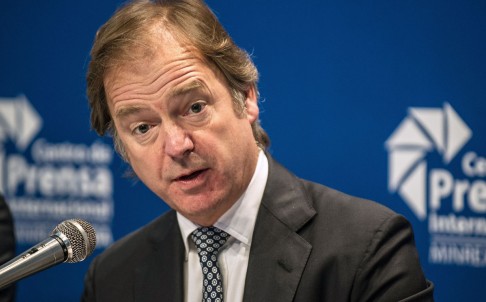
The British government at least has the decency to admit there was nothing sinister in the use by the Hong Kong police of tear gas against Occupy protesters. Too bad you can't say the same about American politicians.
British Foreign Office minister Hugo Swire said this week his government would continue to supply tear gas because no export or international criteria had been contravened. This followed a similar statement from the country's business secretary, Vince Cable. "The use of tear gas by the Hong Kong police was an 'uncharacteristic' response … it was not indicative of a wider pattern of behaviour," he said.
Since late September, our police have effectively been barred from using tear gas. But US President Barack Obama still called for restraint from authorities. His sentiment is perhaps coloured by the American experience that mass protests are often met with overwhelming force from local police. Congressman Chris Smith, chairman of a congressional subcommittee on global human rights, wants to set up a Hong Kong caucus to monitor human rights here. Democratic Senator Sherrod Brown, co-chairman of a commission on China, plans to do the same by strengthening the US-Hong Kong Policy Act of 1992.
It's a wonder how a country whose police forces routinely shoot and kill unarmed minority youths, and break up protests with excessive, even lethal force should lecture us about civil liberties. A recent example is the police response to protests over the deadly police shooting of an unarmed black teenager, Michael Brown, in Ferguson, Missouri in August. A statement by Ferguson protesters said: "In Ferguson, police met our protesting of police brutality with the disgusting irony of greater brutality, the likes of which Americans have rarely seen on our own soil ... Officers tapped their batons, pointed guns in our faces, kneed our women's heads, threw our pregnant mothers to the ground, jailed our peaceful clergy and academics, and tear gassed our children."
It didn't mention the arrests of dozens of journalists. There is an endless list of cases of US police brutality and suppression of peaceful protests.
Americans, put your own security forces in order.
This article appeared in the South China Morning Post print edition as A whiff of hypocrisy over police brutality
Occupy violence at Legco complex a step too far
PUBLISHED : Thursday, 20 November, 2014, 5:43am
Pro-democracy protesters breaking into the Legco Building in Admiralty.
As the world continues to keep a watchful eye on Hong Kong's peaceful Occupy protests, a group of masked activists stormed the Legislative Council complex in the early hours of Wednesday. The break-in has dented the city's image and deserves unequivocal censure from all sides.
The surprise flare-up of violence came as plans were being made to deploy thousands of police officers to help clear the high-risk occupied zone in Mong Kok. Earlier, court officers successfully removed blockades in Admiralty in what was a relatively smooth operation. We appeal to all parties concerned to exercise self-restraint and avoid confrontation.
Until yesterday, the world had been watching in amazement that our mass street protests had continued for more than 50 days without a single piece of glass broken. Apparently misled by false rumours of an imminent vote on the "Article 23 for the internet" - a controversial copyright amendment bill that critics fear would gag freedom of expression and creativity - protesters in Admiralty rushed to the Legco complex late in the evening. They used metal barriers and concrete debris to ram the glass panels, and at least one person managed to get inside before retreating again. At least six people were arrested and the weekly sitting yesterday was suspended.
The government has rightly condemned what it called acts by violent radicals. Pan-democrat lawmakers were also quick to condemn the violence and stressed that it was not part of the Occupy movement. Responses from student groups were less unequivocal. Referring to what they called government inaction to address protesters' demands, one student leader said he understood the frustration of the crowd. This may send the wrong signal that violence is to be condoned.
The incident may be an individual case, but fears are growing that more violence may erupt as patience and tolerance wear thin. The blockade has dragged on for over seven weeks, seemingly without any endgame. Although the organisers have pledged to keep Occupy peaceful and rational, the break-in shows there is no guarantee of peace and order for a public campaign of such scale. A new survey shows that support for an end to the occupation has surged to 83 per cent.
As acknowledged by one of the three core leaders, the disruptions and grievances caused by the Occupy movement have exceeded acceptable levels. It is time protesters packed up and cleared our streets lest more clashes erupt.
This article appeared in the South China Morning Post print edition as Occupy violence is a step too far
Hong Kong legislators propose three-metre fence to keep protesters at bay
PUBLISHED : Wednesday, 19 November, 2014, 2:54pm
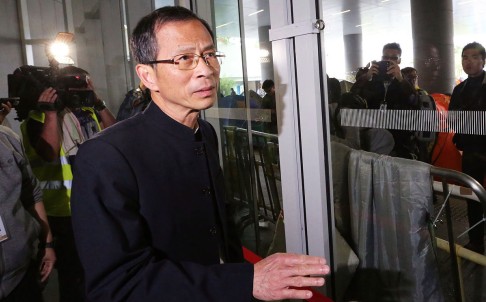
The overnight storming of the Legislative Council complex yesterday prompted 41 pro-establishment lawmakers to support proposals to step up security measures, including installing a three-metre-high fence outside the building and seeking a court order to eject protesters.
But pan-democratic lawmakers object to the measures, saying a fence would keep people at a distance from the legislature and an injunction was inappropriate.
Andrew Leung Kwan-yuen, of the Business and Professionals Alliance, said security had to be strengthened to protect the estimated 1,000 people working in Legco when it is in session - 600 staff in the secretariat, 100 reporters and 300 councillors' assistants.
"Their safety should come first. The Occupy protests have caused safety and hygiene problems. We have asked Legco's legal advisers to study the possibility of an injunction," Leung said.
He cited a rule of the Legislative Council Commission that people using the demonstration areas outside Legco could only remain there for up to 48 hours at a time.
Leung noted that the council could also use the Powers and Privileges Ordinance that makes it a criminal offence to obstruct legislators on their way to and from the building and in the chamber. But he said be believed an injunction would be "more of a deterrent".
Jeffrey Lam Kin-fung, also from Leung's alliance, said erecting a three-metre fence at the Legco car park entrance and the adjacent members' entrance was "worth considering".
Legco President Jasper Tsang Yok-sing said the fence was among measures suggested by a security consultant in a review launched before Occupy Central began in late September, but that the commission had not made a decision on installing it.
"The Legco complex was not designed to cope with a deliberate attack to break in," he said yesterday.
Tsang denied reports that the proposed fence would "surround" the Legco building. The fence would remain open unless it was necessary to close it for safety reasons.
Tsang also said there was no plan to clear the protest area outside the council complex, and Legco's legal advisers would have to study the possibility of an injunction.
But the Civic Party's Ronny Tong Ka-wah, who is also a barrister, said an injunction would be hard to obtain because Legco was not a commercial organisation and it was the government, not the members of Legco, that owned the areas outside the building.
"The place outside is for public use and not for lawmakers' use. At the most, we only have inconvenience in that we can't drive our cars here."
Tong and all other pan-democratic lawmakers objected to erecting the fence, saying it would alienate the public, the very people legislators are supposed to represent and listen to.
This article appeared in the South China Morning Post print edition as 3-metre fence proposed to keep protesters at bay
Overwhelming majority of Hongkongers want Occupy protests to end: survey
PUBLISHED : Wednesday, 20 November, 2014, 9:50pm
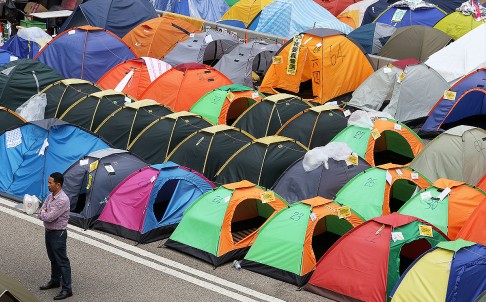
Nearly 83 per cent of Hongkongers want the Occupy Central protests to stop, while more than two-thirds believe the government should clear the protest sites, a University of Hong Kong survey has found.
 Almost 55 per cent of 513 respondents interviewed by the university's public opinion programme on Monday and Tuesday said they opposed the civil disobedience movement, while 28 per cent supported it.
Almost 55 per cent of 513 respondents interviewed by the university's public opinion programme on Monday and Tuesday said they opposed the civil disobedience movement, while 28 per cent supported it.
And 82.9 per cent said the protests, now in their eighth week, should end, while 13 per cent said they should continue. Another 4.1 per cent replied "don't know/hard to say".
The survey findings were released a day after Dr Chan Kin-man, a co-founder of Occupy Central, urged protesters to consider ending their road blockades and instead refocus on winning the long-term support of the public.
More than 68 per cent of the respondents said the Hong Kong government should clear the protest sites, while 25.1 per cent said it should maintain the "status quo". Another 6.8 per cent said "don't know/hard to say".
The survey had a response rate of 65.9 per cent, a sampling error of plus or minus 4.4 percentage points and a confidence level of 95 per cent.
More than 11 per cent of the respondents said they had taken part in the protests, compared to 88.4 per cent who said they had not done so.
According to another survey by Chinese University's Centre for Communication and Public Opinion Survey from November 5 to 11, more than 67 per cent of 1,030 respondents believed the protesters should go home, while 14 per cent believed the opposite.
Dr Ma Ngok, a political scientist at Chinese University, said as the Occupy protests had dragged on for such a long time, some people who were sympathetic to its aims now disagreed with the continuation of the sit-ins without clear goals.
"Many occupiers joined in in the hope of protecting students. Student leaders find it difficult to withdraw from protest zones because they believe they owe a moral responsibility to those occupiers," he said. "The students think they shouldn't abandon the occupiers lightly."
This article appeared in the South China Morning Post print edition as 83pc say Occupy protests must end now


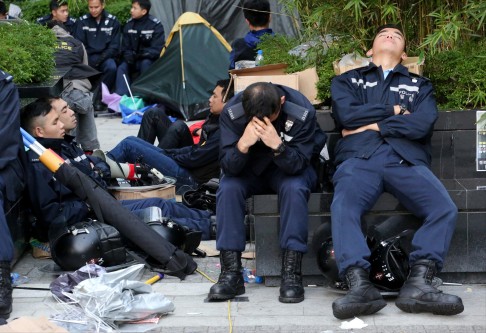

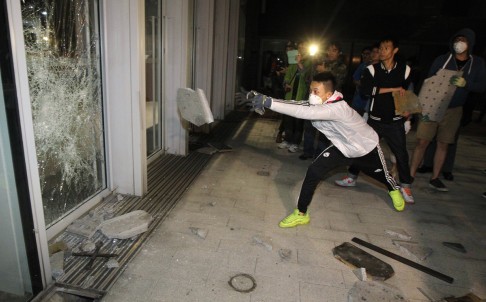
沒有留言:
張貼留言